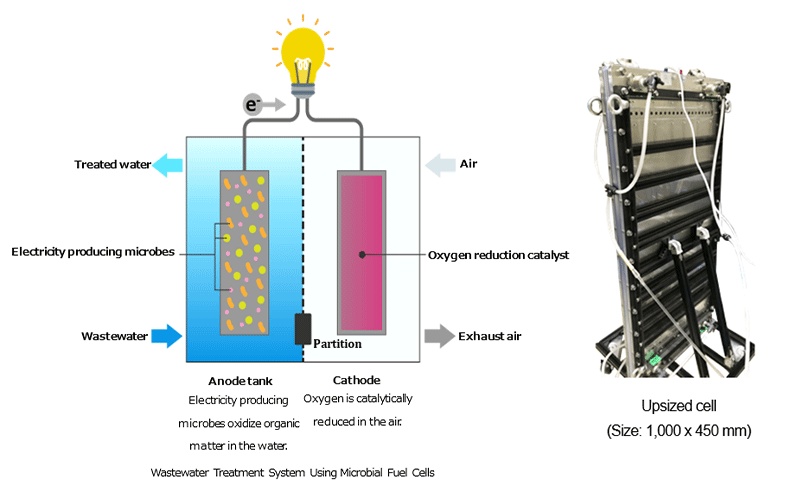2022
January 20, 2022
Kurita Successfully Upsizes a Microbial Power Generation Cell Toward Realization of Wastewater Treatment System Using Microbial Fuel Cells
Kurita Water Industries Ltd. (Head Office: Nakano-ku, Tokyo; President: Michiya Kadota; hereinafter "Kurita") is pleased to announce that it has developed a microbial power generation cell, which can convert organic matter in wastewater into electric energy, and has succeeded in upsizing the cell with an eye to its practical use as a microbial fuel cell. Moving forward, Kurita will begin evaluating potential applications for the cells in actual wastewater, aiming to achieve practical use of a wastewater treatment system incorporating the cells.
Wastewater from plants and factories is treated to improve its quality so that it will not affect the surrounding environment, before it is released into sewerage, rivers, or oceans. However, the active sludge process*1, which is widely used for wastewater treatment, emits a large volume of CO2 due to power consumption for aeration and the treatment and disposal of the large quantities of excess sludge (waste) that is generated in the process. Accordingly, reducing the CO2 emissions has been an issue. Attracting particular attention in this context is the microbial fuel cell, a next-generation technology for creating energy. This cell features use of microbes called electricity producing microbes, which not only decompose organic matter contained in wastewater but also converts the organic matter, which would normally end up as sludge, into electricity. This enables use of the produced electricity for wastewater treatment, thus reducing CO2 emissions. Research and development of this cell has been advanced by research institutions and companies all over the world. However, practical application has yet to be achieved due to issues in the efficiency of wastewater treatment, power generation efficiency, long-term maintenance of stable performance, and upsizing of the cell for practical use.
To address these issues, Kurita has been focusing its efforts on development, building on its extensive knowledge in the water treatment field. It has selected materials that are suitable for the composition of this cell and combined the materials in various ways to identify the optimal shape and structure of the system. As a result, working jointly with Nisshinbo Holdings Inc., Kurita succeeded in upsizing the microbial power generation cell as a step towards its practical use. The companies have achieved the world's highest level of performance with a CODCr removal rate of 20kg/m3/d and output of 200W/m3, which are unprecedented among cells of a size for practical use. Kurita aims to realize wastewater treatment with virtually zero CO2 emissions within a few years.
Moreover, Kurita has applied for more than ten patents for the equipment structure, operation method, and other elements of wastewater treatment powered mainly by microbial fuel cells. Kurita will begin evaluating potential applications with real wastewater in an effort to improve the cell's performance further.
The Kurita Group places corporate social responsibility (CSR) at the center of its management and focuses on creating shared value with society under its medium-term management plan titled Maximize Value Proposition 2022 (MVP-22). Moving forward, Kurita will achieve carbon neutrality*2 of wastewater treatment through the practical use of wastewater treatment system incorporating microbial fuel cells, thus contributing to realizing a sustainable society.
- *1Active sludge process is a method of treating wastewater, with which aerobic microbes are used to decompose organic matter in the presence of oxygen.
- *2Carbon neutrality is a concept used for controlling CO2 emissions. It refers to the idea of achieving zero emissions by balancing CO2 emissions.


